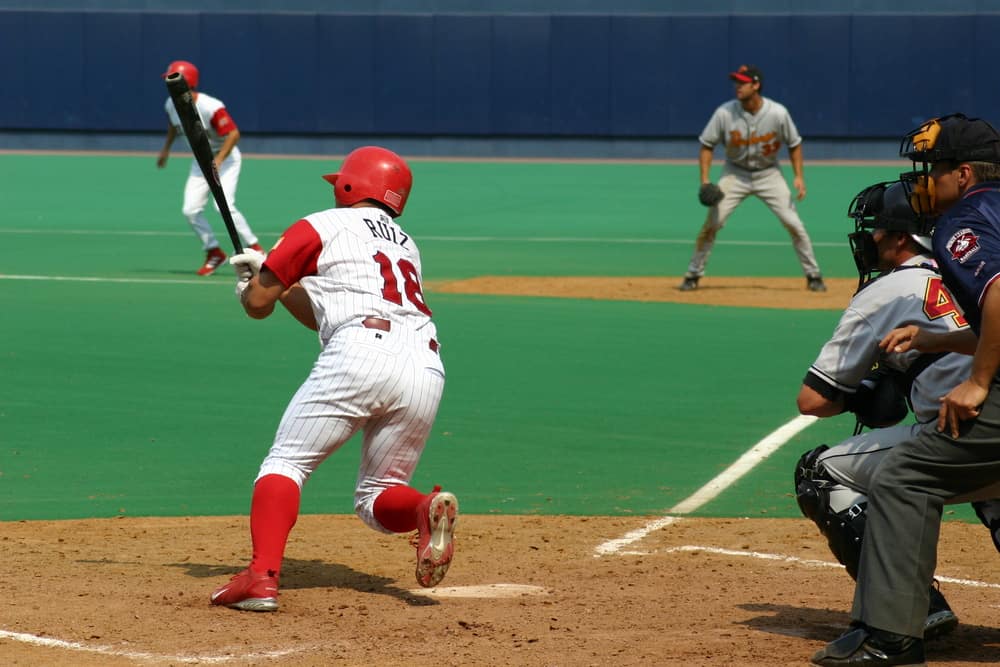An RBI is given to a batter whose appearance results in a run being scored. As with most rules in baseball, there are exceptions. Most significantly, a batter will not receive an RBI credit when the run gained is ground into a double play or the result of an error.
It should be no surprise that run-scoring hits are the most common type of RBIs, but there are other methods. With this in mind, let’s take an in-depth look at all things RBIs in baseball.

What does RBI stand for?
So what exactly is the meaning of RBI in baseball? RBI stands for “runs batted in”. It is a statistic in baseball and softball and indicates how many runs a batter is involved in. When they are part of a play that involves a run being scored, this will count towards their RBI.
A batter will get an RBI if they bat a base that results in a teammate reaching scoring. Even when a batter makes an out, they can be credited with an RBI if it results in a run. An RBI is a part of what baseball fanatics call an offensive Triple Crown. This, along with home runs and batting average, is used to rank and rate batters throughout the season.
What is a good number of RBI in baseball?
For a batter, an ok RBI is around 250, with 300 being very good. Anything around 350 is considered to be excellent. Anything under 250 is considered a bad season.
How many RBIs is good for MLB?
A lot depends on the role of the batter. Batting order counts a lot, so a leading hitter will get on a base that allows others to drive them to the home plate. When they reach home, the hitter gets an RBI. This means a number three or a number four hitter will have more chances to get an RBI than a leading hitter who bats with no one on base.
How does RBI work?
RBI works in numerous ways, including the following most common examples:
- A base hit that scores a run for someone already on a base.
- Hitting a sacrifice fly or ground out ball
- Getting into a fielder’s choice that, in turn, drives in a run
- A home run. Then, additional RBIs for anyone who scored as part of the same play.
- Getting hit by a pitch that drives in a run
- Walking that drives in a run
Why is this stat important?
RBI is important because it indicates the batter’s performance and the team as a whole. Teams will look at statistics and consider how likely a player contributes to a home run based on stats like RBI.
Why might RBI not be a useful stat in baseball?
Although it helps to tell who is responsible for runs driven throughout a season, RBI isn’t always a useful stat for determining a hitter’s effectiveness. Barry Bonds famously walked 232 times in 2004, and intentionally too! At times, teams even walked Barry Bonds to bring in a run, so he didn’t hit. This skewed the RBI rating.
The batting position also has a lot to do with RBI not being so useful. A leadoff hitter’s job is to get on base, but a batter who is 3rd or 4th will have more chance to boost their RBI because the bases may be occupied, so there is more chance of topping up their RBI.
Also, some batters, usually later in the line, set up others to load the bases. When they pass the chance over to the next hitter, they give up the chance to improve their RBI.
Reasons you don’t receive an RBI credit
A batter does not get an RBI credit when the defensive side makes an error. This can include throwing the ball away during a play only for it to bring in a run. It also includes a pop fly in the outfield.
A runner stealing home when the hitter is at the plate does not count as an RBI, nor does grounding in a double play when a run is scored. Any wayward pitch that results in a run does not count towards RBI, and neither does a balk.
FAQ
How is RBI different from OPS?
The main difference between RBI and OPS is that RBI tallies up the number of runs batted in, and OPS looks at the frequency of a hitter getting on base.
Who has the most RBIs in a regular season?
Hack Wilson has the most RBIs in a season, with 191 in 1930. He achieved the accolade with the Chicago Cubs, and it is a record that has nearly stood for 100 years.
Who has the most RBIs in their career?
This is a record that belongs to Hank Aaron. He batted the most RBIs in MLB history with a total of 2,297. Having played for the Milwaukee Braves between 1954 and 1974, Aaron had a 23-year career, and his record remains today.
What is the average RBI in Baseball?
The average RBI in Major League Baseball was 4.32 in 2021.
Does a home run count as an RBI?
A home run counts as at least one RBI, but can result in up to four RBIs. A single RBI is usually awarded to the batter who hit the home run, and additional RBIs are given to any runners who happened to be on base when the home run was hit.
So, if a runner is on first base and the batter hits a home run, that batter would be credited with two RBIs (one for each runner who crossed home plate). If no one was on base, then the solo home run would be awarded one RBI.
Does walking in a run count as an RBI?
Yes, a bases-loaded walk counts as an RBI. When there are three runners on base and the batter walks, that counts as one RBI. The other runners then advance one base each, so the next runner is now at home plate.
What is the definition of RBI?
The definition of RBI in baseball is a statistic that represents the number of runs a player has generated from their at-bats. This is a common way to measure a hitter’s productivity and contributions to their team’s scoring.
How is RBI calculated?
RBI is calculated by counting the number of runs a player has scored as a result of their at-bat. This can include runs scored on a single, double, triple, home run, walk, or hit by pitch.
Who are the all-time RBI leaders?
The all-time RBI leaders are a list of the players who have scored the most runs as a result of their own at-bats over the course of their careers. Some of the players who are near the top of this list include Babe Ruth, Lou Gehrig, Albert Pujols, Alex Rodriguez, and Hank Aaron. These players are among the most productive and successful hitters in the history of the game.
 Written by Mark Bailey
Written by Mark Bailey